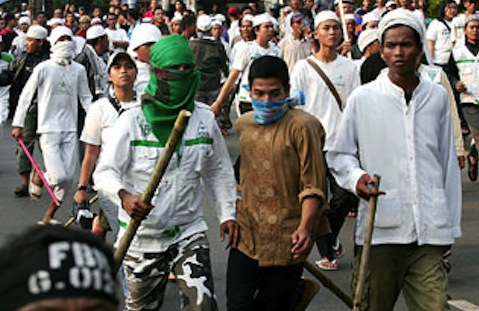
The Indonesian capital is still reeling in the wake of a deadly gang brawl outside a city courthouse. As in most cases of Jakartan gang violence, the young men involved belonged to rival ethnic groups, each with close ties to local politicians who rely on thuggery to manage their constituencies. In fact, it appears that these politicians may have instructed police to take no action when the gangs started amassing for the fight; as one Indonesian criminologist noted, the gangsters “would not dare appear in front of hundreds of police officers, flaunting sharp weapons and firearms, unless they are confident that nobody can touch them.”
The means by which these gangs control vast swaths of Jakarta with their patrons’ blessing is detailed in this essential 2007 paper, a close study of the deceptively named Batawi Brotherhood Forum (FBR):
The organizational backbone of the FBR is its gardu structure of small security posts, usually situated near intersections, markets or bus terminals. Currently the FBR has approximately 185 gardu spread throughout the greater Jakarta region, with the highest concentration being in Cakung. Emulating the territorial command structure of the Indonesian military as well as the pos siskamling neighborhood surveillance system setup by the New Order in the 1990’s, individual gardu are coordinated by a district commander who in turn reports directly to FBR’s central board. Gardu are led by a coordinator and an advisory council, who are given a mandate by the central leadership to seek funds and take action against drug traffickers, alcohol vendors and entertainment venues considered immoral.
One of the main roles of the FBR therefore, has been to establish itself as a quasi-state in the traditional Betawi homeland areas of East and Central Jakarta. “We work with the police, army and government as long as it doesn’t conflict with Sharia…We are ready to join together with the police and the army to eliminate preman”. This involves not just the policing of the area, but also the employment of state paraphernalia and symbolism- uniforms, sirens, motorcycle escorts.
The FBR is also notable for the rather polite extortion letters it sends to local businesses:
With this letter we request the assistance of your business in providing a routine monthly donation to help cover FBR’s operational costs. If you choose to disregard this request then we will assume that you do not care
about the aspirations or welfare of the Betawi people as the indigenous population of Jakarta. This being the case, we, the Betawi Brotherhood Forum will do something to your business that is not in accord with your
aspirations.
This is obviously yet another case of the state ceding governance to a militia, simply because this is easier than actually centralizing control. (Related on Microkhan: Jamaica.) The theory is that the armed groups will always recognize that they must remain subordinate to their political patrons, in exchange for free rein on the streets. But that unspoken contract tends to get broken as the militia leaders’ power swells. The streets and the statehouse and inextricably linked—a truly prosperous society cannot pretend otherwise.


Jordan // Oct 12, 2010 at 3:05 pm
Holding on to a monopoly on violence seems pretty key to state legitimacy. And it never seems to be easy to get it back once you’ve let go. America’s certainly had its own problems on that front, from vigilante “justice” (Wild West, KKK) to the Mafia.
Brendan I. Koerner // Oct 12, 2010 at 5:02 pm
@Jordan: In situations such as this, I think the politicians believe that they can ultimately control the gangs. They are fine with letting them kill each other to some extent, but they are ultimately confident that government forces can step in if the gangs assume too much power. The trouble is, it’s really difficult for the politicians to recognize that line, since they are so far removed from the day-to-day realities of their constituencies.
Captured Shadow // Oct 12, 2010 at 6:13 pm
Thanks Brendan. It is an aspect of Jakarta life that I was totally unaware of.